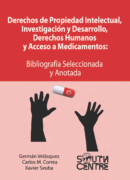South Centre News on AMR 3, 28 August 2017
Antibiotic-resistant gonorrhea crisis: new drugs needed
Antibiotic-resistant gonorrhea crisis: new drugs needed
State of discussion on AMR action, two years after the WHA Global Plan
Civil society and South Centre call for urgent actions to tackle AMR and ensure access and new innovation models
This update provides a snapshot of the activities of the Development, Innovation and Intellectual Property Programme during the month of July 2017.
Intellectual Property in the Trans-Pacific Partnership: Increasing the Barriers for the Access to Affordable Medicines (revised)
Most free trade agreements (FTAs) signed by the United States, the European Union and the members of the European Free Trade Association (EFTA) in the last 15 years contain chapters on intellectual property rights with provisions applicable to pharmaceuticals. Such provisions considerably expand the rights recognized to pharmaceutical companies under the Agreement on Trade-Related Aspects of Intellectual Property Rights (TRIPS) established in the context of the World Trade Organization (WTO). (more…)
Intellectual Property, Public Health and Access to Medicines in International Organizations
This South Centre research paper by Dr. German Velasquez describes and analyses the mandate, programmes, strategies, and activities that different international organizations such as WHO, WTO, WIPO, UNCTAD, UNDP, UNAIDS, the UN Human Rights Council, and the UN Secretary-General’s High Level Panel (UNHLP) on access to medicines have undertaken on the subject of access to medicines, intellectual property, international trade rules and human rights.
This update provides a snapshot of the activities of the Development, Innovation and Intellectual Property Programme during the month of June 2017.
Avoid patent clauses in trade treaties that can kill millions
By Martin Khor
A recent article in a prestigious journal reminds us of how the intellectual property chapter of free trade agreements can prevent the sick from getting treatment. This article also critiques the TPP clauses and warns that they should not be translated to national laws or copied into other FTAs being negotiated. (more…)
On World AIDS Day, threat to access to medicines looms large
By Shailly Gupta
Today millions of people living with HIV in South-East Asia are receiving treatment and leading healthy lives thanks to affordable generic antiretroviral (ARVs) medicines. Governments and treatment providers across Asia, such as the government of Indonesia and Médecins Sans Frontières (MSF), patients across our missions in many countries, depend on an uninterrupted supply of affordable generic HIV medicines to reduce new HIV infections and AIDS-related deaths in the region. But as the trade negotiators from 16 countries gather in Indonesia next week to deliberate the terms of a trade agreement — the Regional Comprehensive Economic Partnership agreement (RCEP), access to low-cost generic medicines is under grave threat. (more…)
Derechos de Propiedad Intelectual, Investigación y Desarrollo, Derechos Humanos y Acceso a Medicamentos: Bibliografía Seleccionada y Anotada

Descripción:
El Centro del Sur ha preparado esta bibliografía seleccionada y anotada para asistir a los países en desarrollo en la implementación de políticas y reglamentaciones en materia de PI de manera coherente con los objetivos de desarrollo y los principios de salud pública. El creciente volumen de literatura que se está produciendo en torno al tema de PI, I+D, derechos humanos y acceso a medicamentos en los últimos cinco años puede ayudar a los países a encontrar las oportunidades y el espacio de maniobra para proteger a los ciudadanos de los países en desarrollo del medio insano que han generado las nuevas normas del comercio internacional.
Autores: Germán Velásquez, Carlos M. Correa, Xavier Seuba
The grant of patents and the exorbitant cost of “lifesaving” drugs
By Germán Velásquez
The important relationship between the examination of patents carried out by national patent offices and the right of citizens to access to medicines hasn’t always been well understood. Too often these are viewed as unrelated functions or responsibilities of the state. And the reason is clear: patentability requirements are not defined by patent offices, but frequently by the courts, tribunals, legislation or treaty negotiators. This is the case when patent policy is implemented in isolation from, rather than guided by, public health policy. (more…)
A matter of life and death
By Martin Khor
Of all the issues currently being negotiated on the Trans Pacific Partnership Agreement, none are more important than the ability of patients to get life-saving medicines at affordable prices, which many fear may be a victim of the agreement. (more…)